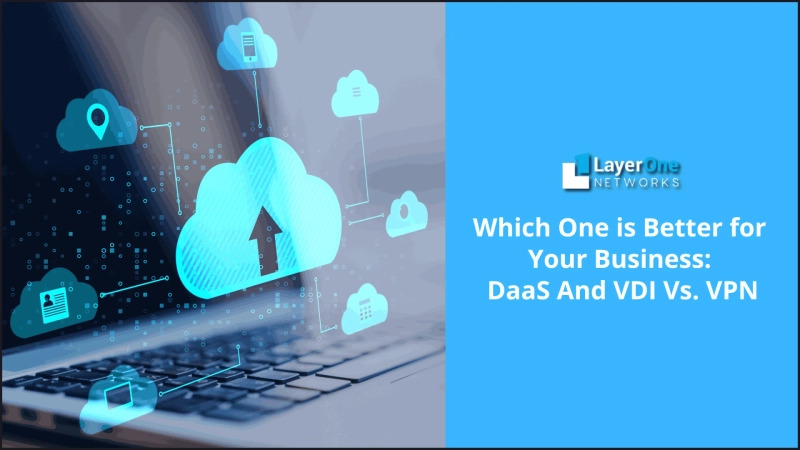Introduction:
With more organizations adopting hybrid or remote work setups, cyber security has become a more significant concern than ever before. As a result, businesses are looking for ways to create secure network infrastructure to keep confidential data safe and ensure uninterrupted productivity.
The three most common methods for enabling remote work are VPN (Virtual Private Network), (Virtual Desktop Infrastructure), and DaaS (Desktop as a Service).
While VPN have traditionally been the go-to solution for secure remote access, recent years have seen the rise of VDI and DaaS as viable alternatives.
But what is your best option for ensuring a secure network infrastructure? Should you continue with a traditional VPN, adopt a virtual desktop infrastructure, or simply opt for a more modernized cloud-based Desktop as a Service solution?
Let's take a more detailed look at each of these technologies and find out.
What is a DaaS?
Desktop as a Service (DaaS) is a cloud computing service in which a network operator offers end users virtualized desktops via the internet that are licensed with per-user subscriptions. IT consulting firms can administer virtual desktops with this solution, whereas the DaaS providers set up and manage the hosting equipment.
When end users log in to the virtual desktop, DaaS providers feed the virtual desktop's screen to the endpoint devices through a network. As a result, the display signal is the only data transmitted from desktops to the personal phones of end users.
Additionally, because DaaS technology is centralized, businesses can control every deployment step from a single administrative interface. IT services can do it without difficulty if they need to send an upgrade to computers or enterprise applications.
What is a VPN?
A Virtual Private Network, or VPN, establishes a safe connection between an endpoint device and another network. Network administrators construct Virtual Private Networks (VPNs), which only permit providing valuable speech through them when we need to work over a system we do not trust and must transfer confidential data.
Employees frequently utilize it to enable secure remote access from various devices, such as PCs or laptops. The safe transfer of data from one network to another is essential because users are visiting a secure network that can contain sensitive information.
The business software must be installed on each end-user device while using a VPN. In addition, the IT administrators must also update every device that requires an application update.
What is VDI?
Virtual desktop infrastructure (VDI) hosts desktop environments on a central server. The user can use the operating system and its apps as though they were running locally, thanks to the virtual desktop image sent via a network to an endpoint device.
It enables businesses to run numerous operating systems and applications on a single physical server in a data center. A desktop operating system, such as Microsoft Windows Desktop, is hosted within virtual machines (VMs) that all run on a host server, enabling VDI.
How are DaaS and VPN different?
DaaS and VPN offer access to apps and data; however, the two alternatives differ somewhat. The administration and the finished sides of a VPN are simple to set up. In addition, they facilitate quick end-user onboarding for IT. The VPN client is downloaded by a new user who logs in and connects to the company network.
A DaaS solution, on the other hand, may involve more setup effort than a VPN because the IT consulting firms must provide each new user with a desktop, profile, home drive folder, and other unique stuff.
A VPN connects to the corporate network and grants access to data and apps. Since they protect corporate data and applications, network slicing, endpoint control, and decentralizing apps are security issues. For the speed and stability of the application, VPNs also primarily rely on the reliability of the internet connection.
On the other hand, the DaaS solution prevents data and programs from leaving the corporate network because the virtual desktop is part of it. DaaS is safer than a VPN connection because users only get the desktop display. This implies that it is less dependent on an internet connection.
What Differs VPN vs VDI
The table below provides a complete comparison between VPN and VDI.
VDI
VPN
Applications
The VDI has business apps installed on it.
Business applications can either be downloaded and installed on the end user's device or accessed online.
Connectivity
A VDI is accessible from almost all devices. An internet connection is all that is required.
A VPN can be used to connect to most devices. Only the company network is accessible via the VPN.
Data Access
Users may be prohibited from copying or moving data to local devices.
The ability to copy files to a local device and data encryption
Cost
VDIs are more expensive, and they frequently come with additional expenses.
VDI is more expensive, whereas VPNs use less resources.
Management
All workstations are configured and maintained via a single administration system.
When utilizing off-site resources, management and troubleshooting are more challenging.
DaaS, VPN and VDI: Which One to Choose?
Scale and security are the most crucial factors when deciding between DaaS and a VPN. A DaaS solution may be too complicated for an organization, as it builds an entire virtual desktop for each user if it has to make a single application on the corporate network access to end users through the internet, for instance.
VDI is constrained and unable to offer the necessary scalability as a business expands. Rolling security updates might be challenging with an on-premises VDI as well. DaaS is preferable in this situation because the provider manages the resources and infrastructure.
However, if security is a top priority for a company, DaaS may be the best choice, even for a single application. Additionally, businesses must remember that VPN and DaaS are both tools for preserving old data and applications. Users will immediately view the information through the internet without DaaS or VPN.
Related Reads
How much good does a VPN really do
Desktop Virtualization is Dass Worth it?
Wrapping up
By now, you've undoubtedly realized that DaaS, VDI, and VPN have their advantages and disadvantages. It's up to you to decide which of them is better for your business. If you need help choosing the right solution, don't hesitate to contact the professional IT security service providers in Corpus Christi. They will gladly assist you and find the best solution for your company!


